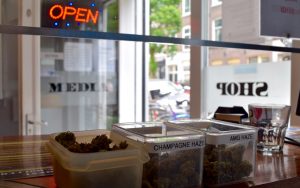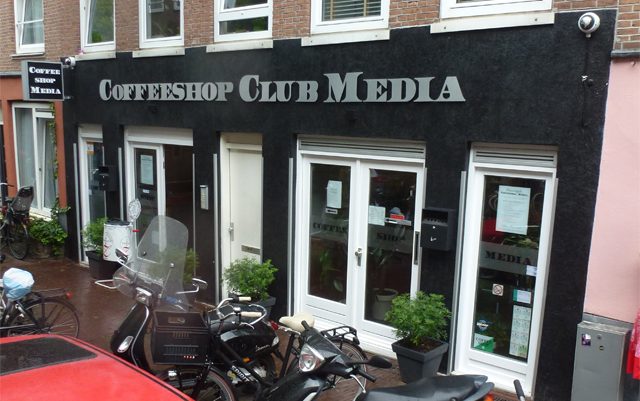Recently I wrote about how the Dutch authorities’ approach to cannabis is killing the coffeeshop model of distribution. The existence of coffeeshops is begrudgingly tolerated, but growing cannabis on a scale that is necessary to supply the coffeeshops is not. This legal and political landscape ensures that coffeeshop owners must interact with an unregulated and criminal market in order to survive.
Ultimately, it is the cannabis consumer who suffers. And these consumers spend good money. It is estimated that Europe spends $10 billion a year on cannabis, according to a recent report from the European Monitoring Centre for Drugs and Drug Addiction (EMCDDA) and Europol.
Horror stories from budtenders that I’ve talked to describe just how bad the product they sometimes sell is. One told me “I’ve sold some terrible quality weed to people in the past. We can’t control what comes in and when you are shifting so much, you have to sell what’s in stock.” Another told me “they put lead in the buds to increase the weight and spray with hairspray to make them sparkle.”
These problems are the result of government policy that is still banging its head off the wall in an attempt to eradicate drug use by cutting off the supply. It’s surprising, given the usually pragmatic and entrepreneurial approach you associate with the Dutch. “We have an old school boys club of politicians in power, none of whom want to go down in history as being soft on drugs,” Nicole Maalsté, a researcher looking into the social impact of drug consumption and the policies surrounding it, explained.
A recent study released in June 2016 highlights the hypocrisy of the current approach. It says the government’s argument that their hands are tied as they must uphold the war on drugs to satisfy the 1961 UN single convention on narcotic drugs, prohibiting the production and supply of a number of named substances, is flawed.
The study was conducted by Piet Hein van Kempen, professor of criminal law and procedure, and lecturer Masha Fedorova, both of Radboud University. It was done on behalf of 27 Dutch municipalities and claims that, in order for the government to uphold their fight against drugs, they have to contravene some fundamental human rights. The fallout of this study has put more pressure on the government to look at the issues holistically to find a way to deal with drug consumption in a way that makes society safer.
A popular concept in Europe is the Cannabis Social Club model, with many local government officials — including Amsterdam’s Mayor — calling for more trails and support for this approach.
It’s not the only approach though. Coffeeshops, despite their issues, have been around for four decades. This time around, they have pretty much nailed the distribution to consumers. The glaring hole in the model, the problem they refer to as the “broken back door”, is outside of their control.
In Amsterdam, a city famous for cannabis and the “drug tourism” it brings, there were once over 300 coffeeshops. Now, through licensing and zoning restrictions, this number has dropped to below 200. The number of consumers has not dropped however, so holding a coffeeshop license is an attractive prospect for the brave and adaptable entrepreneurs who own them.
An average shop is going to have 300 to 400 customers a day and monthly profits will be in the tens of thousands of euros. In the centre of Amsterdam, they get even more passing trade and prices are inflated to capitalise on the euros brought in by tourism.
If you’re one of the lucky people holding a coffeeshop license, it is not something you would like to let go of. Owners would not risk losing their licenses through breaking one of the restrictions laid out by the government.

Coffeeshops are only allowed to carry up to half a kilo of stock at a time (just over a pound). Regular police checks ensure that this is the case. The government is also installing electronic ID readers in the coffeeshops to ensure they can effectively monitor the age of its customers, which must be over 18. The privacy concerns of this should be discussed openly.
The limited number of coffeeshops brings with it some healthy competition. They are starting to clean up their establishments and improve their proposition to their customers.
One such coffeeshop is located in the trendy side of Amsterdam called De Pijp — which uncannily translates to “the pipe”. It’s an arty, creative area that typically pops up in cities when the centre has been gentrified.

For 30 years, Coffeeshop Club Media has served locals on Gerard Doustraat in De Pijp. It was recently taken over by two cannabis industry veterans, Jeroen and Gio, who spent ten years managing Sensi Seeds. Gio is son of Ben Dronkers, Sensi Seeds founder, and one of the leading pioneers of Europe’s cannabis industry. They know as much as there is to know about quality cannabis. With Club Media Coffeeshop, they focus their efforts on providing what is best for the cannabis consumer.
The majority of strains on their menu of 17 weeds and 15 hashes are organic. The prices reflect their approach with strains being around 30% cheaper than those sold in coffeeshops in the centre of town, only a 10 minute walk away.
It’s an attractive prospect for tourists hoping to enjoy high quality marijuana and hashes in an environment that is more akin to a trendy coffee bar than you would normally associate with other coffeeshops.
Entering a coffeeshop for the first time can be an intimidating experience. In many establishments, this is more so thanks to blaring techno, unhelpful tourist teasing budtenders and grungy locals adding to the paranoia. Top that off with over priced drinks and toilets in a poor state, and it’s no wonder they can be perceived as a problem to be tackled.
Club Media is one of the establishments attempting to buck this trend. “Our clientele is now 50% tourists and 50% locals,” Gio tells me. “It is a club, so we can control which locals can enter. We welcome members of the club and tourists. Tourists don’t have to be a member but must be in a suitable state to not disturb other customers.” Whilst we conducted the interview there was a table of six young, professional looking French tourists on the other side of the “cafe” area. It was Sunday AM, so about as quiet as it would get. “Things will pick up later on,” Gio assured me. I didn’t doubt it.
The place is clean and inviting; from the tidy shop front — that does not look out of place in the street of clothing boutiques and cafes — right through to the toilets, that could be straight out of an upmarket restaurant.
The coffeeshop has a front area in which people can quickly drop in and buy their buds. They are limited by law to only sell five grams at a time to each customer. If they wish to stick around, they are buzzed into the cafe area which is adorned with cannabis themed images from German photographer Sebastian Marincolo.
I left convinced this is how cannabis should be sold. I grow my own because the more I learn about cannabis, the more I realise you need to watch what goes into the buds you consume. If I had easy access to a coffeeshop like this, my growing would quickly switch to a hobby rather than a necessity.
You can’t help but take your hat off to the entrepreneurs who have kept the coffeeshop industry ticking along at the level it is now in a constantly changing landscape. Fixing the back door issue is not a huge leap. Everything that needs to exist already does exist; it just needs a realistic approach from authorities to help ensure regulations from seed to coffeeshop.
Coffeeshops are tolerated, but applying toleration at the point when the product is already being passed to consumers is too late. People do not know what they are buying and don’t even know that they should know what they are buying.
Jeroen and Gio of Club Media Coffeeshop demonstrated that they are doing the best they can — under the current circumstances — to protect cannabis consumers. Maybe it’s time the government should do their best to ensure the safety of their citizens and paying tourists visiting their cities?






